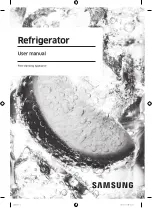
the cold air to escape and the refrigerator to operate
poorly.
Avoid contact with the cold plate / internal walls of
the freezer compartment when your hands are wet
or damp. The low temperatures may injure your
skin.
Do not sprinkle water on top or along the sides of
the refrigerator, as this can cause a malfunction or
electric discharge and may cause the metallic parts
of the refrigerator to rust. To avoid the risk of fire,
never place lit candles on top of the refrigerator. In
the event of a gas leak, do not unplug or touch the
refrigerator until the gas valve has been closed, and
the room has been aired out. If you use the
thermostat immediately afterward, it may give off
sparks that could start a fire. When moving the
refrigerator, do not incline it at more than a 45°
angle.
Keep the cord away from the compressor, as the
compressor heats up when it is operating, and may
damage the cord, which could cause a short circuit.
05
18
Solutions to Problems
Condensation outside the
refrigerator
According to international standard ISO8187,
d o m e s t i c r e f r i g e r a t o r s , f r e e z e r s a n d
refrigerator/freezers should not present
condensation outside.
However, when installed in areas with relative
humidity above 80% and room temperatures above
32°C (89.60°F), it is normal for the refrigerator to
have some outside condensation (moisture).
Door seals
When the door(s) are closed, an internal vacuum
forms. This can make it difficult to open the door.
We recommend waiting a few seconds before
reopening it/them.
Normal Operating Noises
When the refrigerator is turned on and off, it may
make a clicking noise that is perfectly normal. This
is the thermostat going off and on. (temperature
control).
While the refrigerator is running, it may make a
"screech", especially when the door is open.
This noise is due to the expansion of the cooling
fluid inside the refrigerator. It does not mean there is
a problem with the appliance.
Due to the door's sealing system, noises and clicks
may be heard when closing the door. This is the
result of the sudden cooling of inside air.
The compressor may make a noise or a pulsing
sound. This is a characteristic of modern
compressors that operate at higher speeds than
older models.
Contraction and dilatation of inside components,
due to temperature variations, can cause soft
clicking noises in the refrigerator.






























